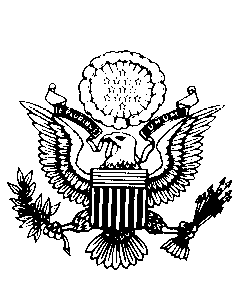 |
TASK FORCE ON TERRORISM &
|
 |
U.S. House of Representatives
Washington,
D.C. 20515
ERIC CANTOR, Virginia
CHAIRMAN
November 14, 2001
If our nationís War on Terrorism is to be ultimately successful, it must be fought on many fronts. The first and most obvious step is to engage in hostile action against the terrorist organizations and the states that sponsor them and eliminate their ability to attack the citizens of the United States.
But if we are to be truly successful, we must take the necessary steps to strengthen security at our own borders and provide our nationís law enforcement entities the tools they need to remove those individuals that enter or remain in the United States illegally. Many of the terrorists involved in the attacks of September 11 were in the United States illegally. They were able to exploit poor enforcement of immigration laws and, in some cases, remain in the United States on expired visas.
To address this vital national security issue, the United States Congress passed the Uniting and Strengthening America by Providing Appropriate Tools Required to Intercept and Obstruct Terrorism (USA PATRIOT) Act of 2001, and on October 26, 2001, the President signed it into law. Included in this bill were law enforcement tools such as:
- information sharing between agencies;
- the combining of the intelligence databases of the State Department, CIA, INS, FBI and National Crime Information Center;
- increased ease to gain wire tap warrants;
- authority to detain foreign nationals for seven days before prosecution begins;
- stronger money laundering law; and
- the creation of new federal crimes, increased penalties for existing crimes, and less procedural burdens with an eye to punishing terrorists.
While the PATRIOT Act is a strong first step, the Task Force on Terrorism and Unconventional Warfare suggests that we need to go further. People from around the world have often traveled to our shores to experience our culture, education system and democracy. On September 11, 2001, when terrorists struck our country, we learned that this was no longer a safe presumption. We need to:
- increase oversight of all foreign student visa holders within the United States;
- require schools to report to the FBI absent student visa holders within 30 days of the start of classes;
- increase oversight over all H1-B visa holders within the United States;
- require employers to report to the FBI on the whereabouts of the sponsored employees;
- tighten visa eligibility standards for nations from which visas are not required for entry to the United States; and
- cut off visas from countries who issue passports to known terrorists and offer punitive measures against these countries such as cutting off foreign aid.
Terrorists use our border countries as gateways to enter the United States. In the past two years we have seen some success in apprehending terrorists who were attempting to enter our country from our northern Canadian border. It is crucial that we find ways to increase security by working with our neighbors to eliminate the ability of terrorists to enter the United States.
The reality that we face in the aftermath of September 11 is that terrorists have hijacked our visa system, a legal process designed to provide access to our democracy, and exploited weaknesses in our law enforcement capabilities to wreak havoc upon our society. Only when we can defend ourselves from the enemy within can we truly state that we have won the war on terrorism.